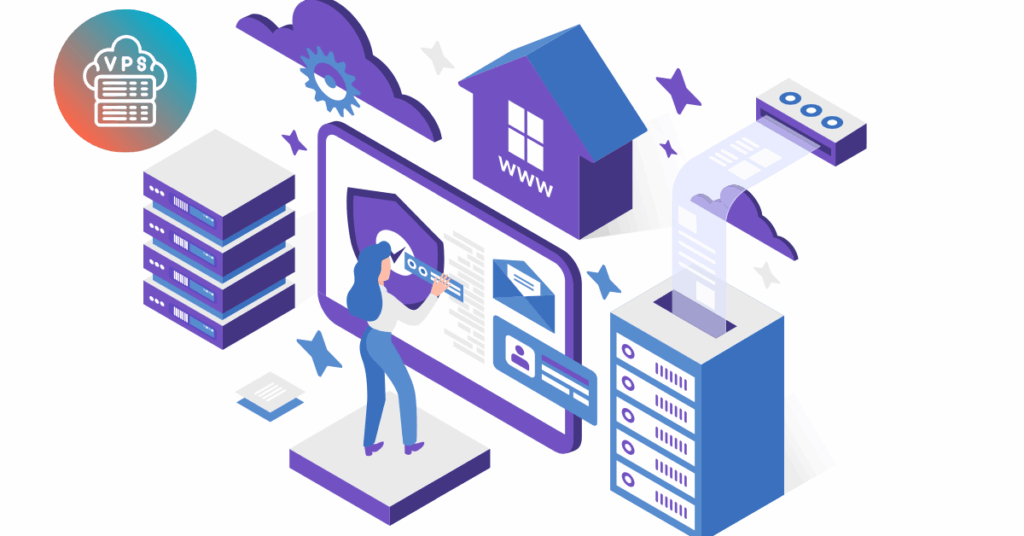Last updated on April 17th, 2025 at 08:03 am
Let’s answer what VPS web hosting is. One term that shines brightly from the landscape of web hosting is Virtual Private Server (VPS).
This remarkable hosting solution bridges the gap between shared hosting and dedicated servers.
It offers website owners the following:
- The unique blend of control
- Performance
- Cost-effectiveness
In this comprehensive guide, we will deeply dive into VPS web hosting. We’ll understand its core concepts, advantages, and when it’s the right fit for your website.
What is a VPS, and how does it work?
At its essence, a Virtual Private Server is a virtualized environment that partitions a physical server into multiple independent virtual servers.
Each VPS operates within its dedicated resources, including CPU, RAM, and storage, ensuring optimal performance and security.
The virtualization technology, facilitated by hypervisor software, enables multiple VPS instances to coexist seamlessly on the same physical server.
To better grasp the uniqueness of VPS hosting, let’s compare it to other prevalent web hosting types:
- Shared Hosting – Shared hosting, akin to a bustling apartment building, houses multiple websites on a single server, sharing resources. While cost-effective, this setup can lead to performance bottlenecks during peak traffic.
- Cloud Hosting – roams like a nimble cloud, distributing your website across multiple interconnected servers. It offers high scalability and reliability, making it suitable for websites with varying traffic demands.
- WordPress Hosting – Crafted for WordPress enthusiasts, this hosting type is specifically optimized for the popular CMS. Pre-configured settings, enhanced security, and improved performance cater to the unique requirements of WordPress websites.
- Dedicated Hosting – grants complete control over an entire physical server to a single user. While offering unparalleled resources and freedom, it comes with a higher price tag.
Pros of VPS web hosting:
- Cost-effectiveness: VPS strikes an ideal balance between cost and performance, making it a cost-effective solution for businesses with moderate resource requirements.
- Enhanced performance: With dedicated resources, VPS ensures consistent performance even during traffic spikes, ensuring a seamless user experience.
- Customization and Control: VPS empowers website owners with complete control over their virtual environment, enabling software installations and configurations per their needs.
- Scalability: As your website grows, VPS can quickly scale its resources to meet increasing demands, avoiding disruptions during expansion.
- Security: VPS hosting can offer better security than shared hosting. Your website is isolated from others on the same server, reducing the risk of a security breach.
Cons of VPS web hosting
- Technical expertise: Managing a VPS requires a certain level of technical knowledge, which may be daunting for beginners.
- Responsibility: Unlike shared hosting, you are responsible for the server’s maintenance and security, necessitating a proactive approach to ensure smooth operations.
When is the right time to upgrade to a VPS?
Knowing when to upgrade to VPS hosting can significantly impact your website’s performance and user experience.
Here are some signs indicating it’s time to leap:
- Performance lag- frequent slowdowns and extended loading times are signs that your website is outgrowing its current hosting environment.
- Traffic surges- if your website experiences sudden traffic spikes, VPS can handle the increased load without compromising performance.
- Security concerns- a VPS’s enhanced security and isolation are crucial for websites processing sensitive data or conducting transactions.
- Unable to install or run specific applications- some applications, such as e-commerce platforms or content management systems, require more resources than shared hosting plans offer.
- Experiencing frequent downtime- if your website is going down frequently, it might be a sign that you need more resources or a more reliable hosting provider.
Can you have a VPS alternative? Yes, for those not into technical management, there is an option for you.
A managed VPS is the perfect choice. The hosting providers manage server setup, maintenance, and security.
Now you can focus solely on content and business growth. VPS is suitable for you for the following:
- Supports growing businesses: VPS can accommodate increased traffic and resource demands as your business expands.
- Takes care of resource-intensive websites: Websites with high multimedia content or complex applications benefit from the dedicated resources offered by VPS.
- Viable for e-commerce Platforms: Security and performance are paramount for online stores, making VPS an ideal hosting solution.
The distinction between web hosting and VPS
In a nutshell, the main difference lies in resource allocation and isolation. Traditional web hosting (shared, cloud, or dedicated) shares resources among multiple users.
VPS allocates dedicated resources to each virtual server, ensuring enhanced performance, security, and customization capabilities.
Sum up;
Now you know what VPS web hosting is. Proceed to make informed decisions that will elevate your online presence.
Whether running a growing business, a resource-intensive website, or an e-commerce platform, VPS hosting offers the perfect balance of power, control, and affordability.
Embrace the marvels of VPS hosting and witness your website thrive in the dynamic digital landscape!






